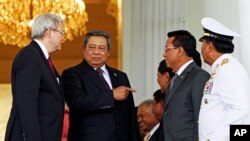JAKARTA —
Australian Prime Minister Kevin Rudd met his Indonesian counterpart, President Susilo Bambang Yudhoyono, for talks that focused on trade and border security, but still made little headway on the prickly issue of asylum seekers.
When Rudd met the Indonesian president on Friday, an Australia-bound boat carrying as many as 80 refugees was floating in distress in the seas south of Java.
Indonesia’s national search and rescue agency later reported that the boat had recovered, but the news underlined a thorny issue between the two neighbors.
Stemming the flood of asylum seekers into Australia has been at the heart of recent debates there and is seen as a key issue in elections scheduled for September.
But Indonesia has resisted suggestions that Australia would tow boats carrying asylum seekers back into its waters.
Tim Lindsey, director of the center for Indonesian law, Islam and society at Melbourne University, explains.
"The questions of asylum seekers and boats arriving in Australia is a very big issue in Australian domestic politics, but it’s not in Indonesia because Indonesia is a transit country. What they have in common is that neither country wants asylum seekers, but for Indonesia dealing with them means letting them go to Australia. Australia’s problem is much more complex," said Lindsey.
Each year thousands of asylum seekers make their way to Australia aboard overcrowded, rickety boats that often sink. Hundreds of people have died since 2009 from accidents on the high seas. Many of them transit through Indonesia, and in recent years the number of asylum seekers entering the country has tripled.
On Friday President Yudhoyono said that meant the countries needed to work together to find a regional solution.
"All sides must take responsibility and perform concrete action. It is not fair if it is only Indonesia and Australia that must deal with the problem. Indonesia has been receiving thousands of boat people from several countries of origin. We have been coping with the problem and it is not fair if we have to deal with it alone," said President Yudhoyono.
President Yudhoyono said he would work to organize a regional summit with destination countries, countries of origin and transit countries such as Indonesia, to find a solution to the asylum seeker problem. Rudd applauded the move.
Earlier in the day Prime Minister Rudd had sidestepped the asylum seeker issue by focusing instead on boosting business and trade ties with Indonesia, one of Asia’s largest and fastest-growing economies.
During a breakfast meeting with business leaders, Prime Minister Rudd called on Indonesia to lower trade barriers, and talked about how both countries could benefit by cooperating more on beef, a key industry for Australia.
“By 2015, Indonesia's beef consumption of 530000 tons will exceed domestic production. Together we can do more than simply satisfy rising domestic demand and ensure a steady supply of beef for Indonesia, we can help build the value chain to satisfy the markets of the world," said Rudd.
Prime Minister Rudd said Australia could also provide Indonesia with genetic technology to help the country grow its cattle herd.
When Rudd met the Indonesian president on Friday, an Australia-bound boat carrying as many as 80 refugees was floating in distress in the seas south of Java.
Indonesia’s national search and rescue agency later reported that the boat had recovered, but the news underlined a thorny issue between the two neighbors.
Stemming the flood of asylum seekers into Australia has been at the heart of recent debates there and is seen as a key issue in elections scheduled for September.
But Indonesia has resisted suggestions that Australia would tow boats carrying asylum seekers back into its waters.
Tim Lindsey, director of the center for Indonesian law, Islam and society at Melbourne University, explains.
"The questions of asylum seekers and boats arriving in Australia is a very big issue in Australian domestic politics, but it’s not in Indonesia because Indonesia is a transit country. What they have in common is that neither country wants asylum seekers, but for Indonesia dealing with them means letting them go to Australia. Australia’s problem is much more complex," said Lindsey.
Each year thousands of asylum seekers make their way to Australia aboard overcrowded, rickety boats that often sink. Hundreds of people have died since 2009 from accidents on the high seas. Many of them transit through Indonesia, and in recent years the number of asylum seekers entering the country has tripled.
On Friday President Yudhoyono said that meant the countries needed to work together to find a regional solution.
"All sides must take responsibility and perform concrete action. It is not fair if it is only Indonesia and Australia that must deal with the problem. Indonesia has been receiving thousands of boat people from several countries of origin. We have been coping with the problem and it is not fair if we have to deal with it alone," said President Yudhoyono.
President Yudhoyono said he would work to organize a regional summit with destination countries, countries of origin and transit countries such as Indonesia, to find a solution to the asylum seeker problem. Rudd applauded the move.
Earlier in the day Prime Minister Rudd had sidestepped the asylum seeker issue by focusing instead on boosting business and trade ties with Indonesia, one of Asia’s largest and fastest-growing economies.
During a breakfast meeting with business leaders, Prime Minister Rudd called on Indonesia to lower trade barriers, and talked about how both countries could benefit by cooperating more on beef, a key industry for Australia.
“By 2015, Indonesia's beef consumption of 530000 tons will exceed domestic production. Together we can do more than simply satisfy rising domestic demand and ensure a steady supply of beef for Indonesia, we can help build the value chain to satisfy the markets of the world," said Rudd.
Prime Minister Rudd said Australia could also provide Indonesia with genetic technology to help the country grow its cattle herd.




